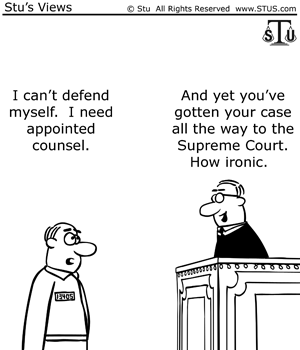
This month marks the 50th anniversary of Gideon v. Wainwright, the case that established the right to counsel for indigent defendants. Or in plain English, the case that meant if someone is facing criminal charges and can’t afford an attorney, the state will provide one.
The definitive, inimitable book on the subject is Gideon’s Trumpet by Anthony Lewis, published in 1964. It’s a wonder of well-structured storytelling, an oddly riveting book about a case in which the outcome is no mystery. I’ve been rereading it lately, and it’s been making me think a lot about what Gideon means today, particularly in the civil context. There is no equivalent right to counsel in civil cases.
Civil Gideon is a matter of debate even among people who agree that the current system, in which many (maybe most) litigants don’t have lawyers. Clearly, having people unequipped to litigate their own cases trying to muddle through isn’t optimal. But which civil litigants if any should have publicly-funded lawyers is a whole different question.
The thing that’s really striking to me as I read Gideon’s Trumpet is that Clarence Earl Gideon, the defendant in the famous case, was remarkably able to follow court procedure given that he was not a lawyer and indeed had very little formal education; he “made all his grades up to the eighth grade,” as he wrote in a letter to Abe Fortas, who would represent him before the Supreme Court. He was a drifter, a petty criminal, in and out of prison from the age of fifteen or so. When he was charged with breaking and entering a Florida poolhall in 1961, he was 41. He asked for a lawyer in the case and was denied. He managed to call witnesses and cross-examine them, but, as Lewis points out, didn’t raise key questions or advance arguments that would be obvious to an attorney. And then when he was convicted, he managed to file all the right paperwork to ask the Supreme Court to hear his case.
Most people, then and now, can’t do that. People don’t have the knowledge, don’t know where to send paperwork, don’t know how to ask in the right way. The cuts to prison systems and law libraries, and the rise of extreme isolation, make those skills even harder to acquire.
Most people, like Gideon, also can’t advance key arguments or raise crucial facts in their civil cases. They might lose their house, their kids, their wages. They might be deported. Though not criminal, the stakes are still high.
So as I’ve been reading Gideon’s Trumpet and documents associated with the case, I’ve been thinking a lot about how and where the logic behind Gideon might apply in the civil arena. And in some ways, more than thinking about the logic, I’ve been thinking about the emotion, the gut feeling of the case: is this right? Is this just? That’s what the justices were grappling with in Gideon, and I think it’s something most people who spend time in civil court grapple with too.
For more from Kat Aaron on Gideon and civil representation, see her blog Not So Civil Justice.
Cartoon credit: Stu’s Views at stus.com









